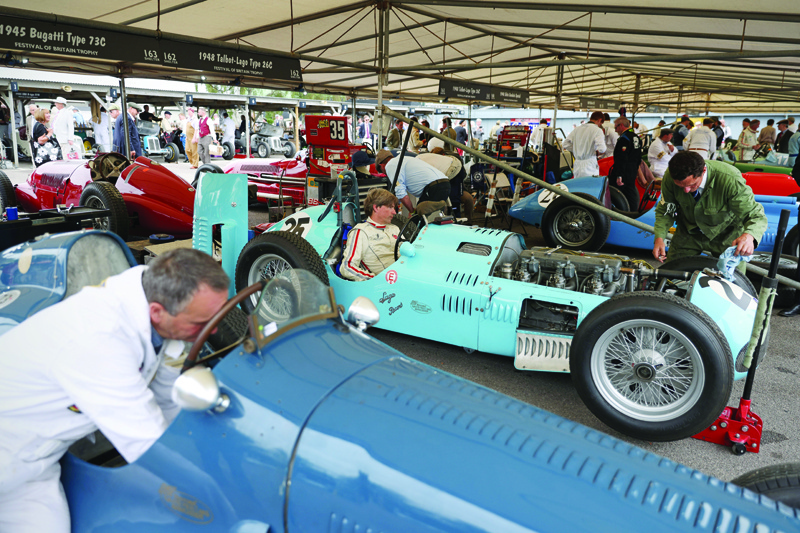 CHICHESTER, US: People attend the Goodwood Revival meeting 2021, north of Chichester in southern England. As vintage cars of all shapes and sizes spanning the last century roared around England's Goodwood Motor Circuit last weekend, one thing stood out to seasoned observers: far fewer Europe-based drivers. - AFP
CHICHESTER, US: People attend the Goodwood Revival meeting 2021, north of Chichester in southern England. As vintage cars of all shapes and sizes spanning the last century roared around England's Goodwood Motor Circuit last weekend, one thing stood out to seasoned observers: far fewer Europe-based drivers. - AFPCHICHESTER, UK: As vintage vehicles of all shapes and sizes from the last century roared around England's Goodwood Motor Circuit last weekend, something stood out to seasoned observers: far fewer cars and drivers from Europe. Meanwhile, historic racing events on the European mainland have seen a dramatic drop in UK classic vehicle owners and teams competing-a bigger loss to a pursuit Britain has always dominated.
Industry insiders blame the shift on the travel-throttling coronavirus and Brexit, which has made transporting cars and tools across the Channel more costly and onerous. Opinion differs over the long-term impacts of both on the economically valuable sector, with some predicting busy but more insular UK events alongside less competitive races on the continent.
"The British are the number one in terms of classic cars... so without the British, probably you get 50 percent less people and competition," said owner Calilo Sielecki, whose collection includes a UK-based 1954 Aston Martin DB3S. A two-time runner-up at France's famous Le Mans races-and a similar model to those driven by James Bond, the British agent in the blockbuster 007 film franchise-it was among the British absentees from April's Monaco Historic Grand Prix. That event recorded nearly half as many UK-based drivers or vehicles participating compared to 2020.
"We didn't go... because it was complicated about the pandemic and also because of moving the cars," Sielecki told AFP from Goodwood's annual Revival meet, where his son Mathias competed in the DB3S. The 63-year-old Argentinian said taking it to Monte Carlo next year was "not impossible" but the "tough" new transport requirements could prove an obstacle.
'Damaging'
Carol Spagg, managing editor of Historic Motor Racing News, cautioned it was "too early to tell" whether Britain's departure from the European Union would have a lasting effect. "The COVID situation has meant that cars have not been crossing borders in anything like the usual numbers," she noted. Spagg is keeping a keen eye on next week's Spa Six Hours in Belgium, another major meet, where a "healthy" 106 British-based drivers are registered for its main endurance race.
Patrick Peter, head of France's Tour Auto events, noted its signature rally from Paris to near Marseille this month attracted just three UK-based drivers, compared to 18 in 2019. "We don't know what's happened for what (reason)," he explained. "But clearly there is some negative impact from Brexit."
Others argue ending the easy cross-Channel movement of cars on trailers and mechanical items since January could mean permanent and damaging change. "You've got to sort out all sorts of paperwork... it's damaging-mainly on the continent," said Hans Hugenholtz, a Dutchman living in Belgium who owns a fleet of classic cars, including seven he races. "We like racing with the Brits and against them. But on the continent now, competition is just different and it's a pity."
'Pieces of art'
Hugenholtz, 71, was among the handful of Europeans at Goodwood, with his 1959 Lister-Jaguar "Costin" and two other cars. He moved it from Britain to Europe two days before Brexit took full effect in January to minimize the imminent bureaucracy. Now when the veteran racer brings the high-value car to English events, he faces an "enormous amount of hassle" and expenses. Owners must complete lengthy paperwork for any cars crossing the Channel on a trailer, and itemize each of the hundreds of tools that might go with them.
They must also provide a deposit to guarantee customs duties and taxes, which owners say is 40 percent of their vehicles' value-typically hundreds of thousands of pounds. Hugenholtz's visit required the listing of 2,100 items on paperwork which took three weeks to complete and cost thousands of euros on top of downpayments. He urged London and Brussels to exempt classic cars from the carnet scheme. "They're collectibles-they're pieces of art," Hugenholtz said.
'Roadblock'
Others in the industry appear less concerned but still have more questions than answers. James Walker, whose Classic Automotive Relocation Services firm ships cars to events, said the sector was yet to see "the full extent of Brexit". But he was doubtful it would prove a future deterrent. "You're talking about people that are highly passionate... like to drive around the streets in Monte Carlo. Is it really going to put you off in the long-term?"
One such person, Andrew Hayden, who owns a 1962 Jaguar E-type, is adopting a wait-and-see approach. "There's a lot of racing in the UK... there's a lot of choice," he said, noting European events now came with "a lot of hassle and a lot of cost." "It's a roadblock," Hayden added. "At the moment, it gets into the 'too difficult' box. The question is, will it just get easier with time?" - AFP









